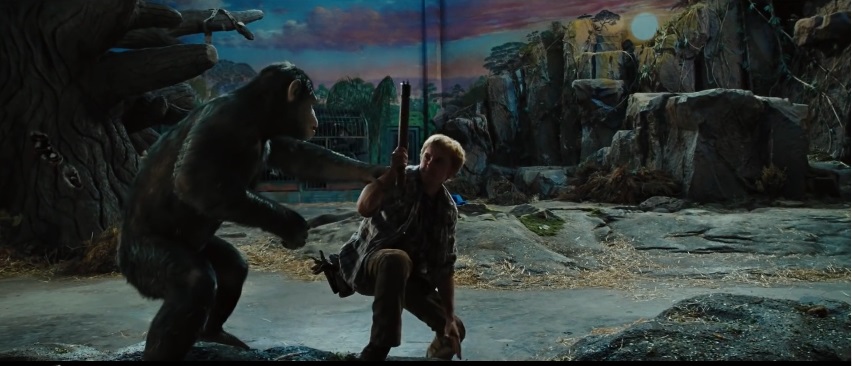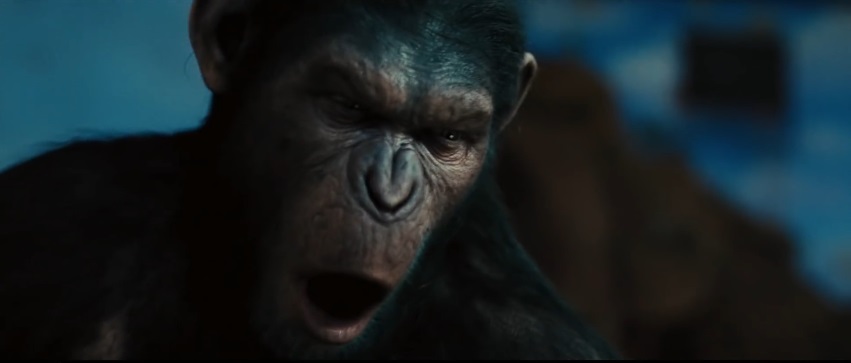
The scene which I believe most questions anthropocentric notions of human superiority in ‘Rise of the Planet of the Apes’ is the moment when Caesar verbally expresses his frustrations, in defence against his oppression and abuse.
The film depicts animals gaining agency against being controlled by humans in many forms, such as pet-keeping, animal testing and experimentation and being forced into human controlled spaces such as zoos and sanctuaries. The drug, as a symbol of anthropocentrism, which causes the deaths of many apes due to side effects, as well as being separated from their natural habitats, is used by Caesar for animal rather than human gain, in order that the apes in the sanctuary can cooperate in the escape plan. Many apes within the film, however, display the ability to communicate without the use of the drug. This can be seen in the circus orangutan, who can communicate with Caesar through sign language, as many apes can be trained to do. This again is an example of human intelligence being used for animal gain, therefore I believe that it is anthropocentric to assume that apes are unintelligent. I believe that they are aware of their abuse without the aid of human drugs.
The scene begins with Dodge entering the play area to find Caesar stood in a defensive stance on two legs. The scene uses dark lighting, which mirrors the evil abuse which is about to take place, as Dodge gives Caesar electric shocks with a rod.
Before the attack, suspense is built through the removal of non-diegetic sound and a heightening of diegetic sound such as the electric rod being charged, along with the close up shot and cracking of Caesars knuckles. Tension is built as the audience are concerned for Caesars safety, as they are encouraged to favour him in comparison to many of the abusive human characters in the film. However, the audience are also aware of the advantage that Caesar has in the sheer strength of his body and so they are forced to imagine themselves in the position of Dodge, approaching a potentially very dangerous animal. This is intensified by the degrading language which Dodge uses towards Caesar when he says ‘get .. get back in your cage’ which is anthropocentric and places the audience in an elevated position through dramatic irony, as they are aware that Caesar is much more intelligent than Dodge assumes.

As the fight reaches a climax the drumbeat builds, and Caesar grabs hold of Dodge’s arm where he was about to strike him over the head and Dodge yells ‘take your stinking paws off me you god damn dirty ape’. Audience members who have seen ‘Planet of the Apes’ will know the famous reference, which is originally made by Taylor who shocks the apes when he speaks, as they believed that he was inferior and unable to use language due to him being a Neanderthal like Nova.
In ‘Rise of the planet of the apes’ however the species are swapped around so that it is Caesar’s ability to speak which shocks the audience. The camera angle lowers when Caesar has Dodge in his grasp and his face fills the screen as he interrupts the building drum roll by shouting ‘no’. There is then seven seconds of silence and a montage of shocked expressions mirroring the audiences which the director uses to highlight the importance of this moment within the film.

Why is this moment so significant when Caesar has displayed a cognitive ability matching human intelligence throughout the film? I believe that the director’s choice to have Caesar use human language generates shock, as this is the first time in the film that we have seen an animal under abuse verbally demonstrating their anger and refusing to take commands from humans. By reversing the power dynamic between humans and animals, the film comments on the anthropocentric notions that animals are inferior because they do not have the ability to use human generated language, which humanity has used to separate themselves from the animal and gain authority over them. By humanising Caesar and enabling him to speak, the director shows that animal mistreatment and injustice is so extreme that animals would need to express verbally their anger for humans to wake up and consider the impact that their actions have towards animal suffering, rather than blissfully ignoring their cries.